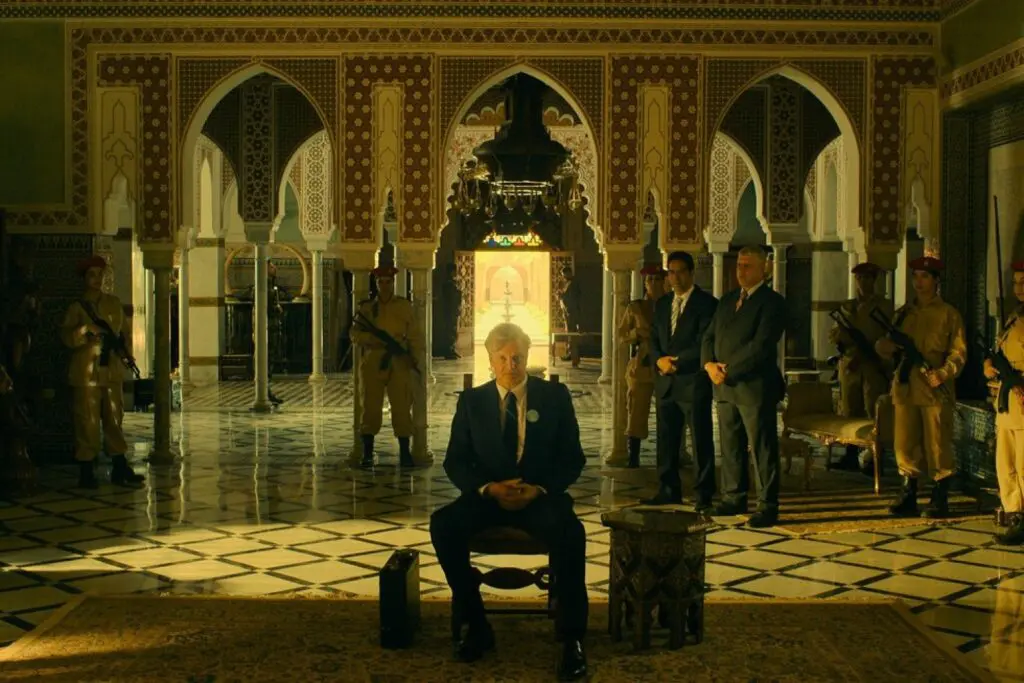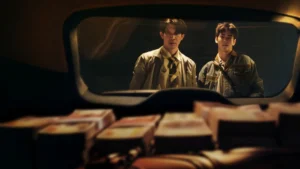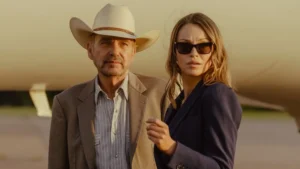Summary
Lockerbie: A Search for Truth benefits from a superb Colin Firth performance, but the complex story runs away from him.
I’m not sure Lockerbie: A Search for Truth quite constitutes a Christmas show, despite beginning on December 21, 1988. You might recognize that date. It was when Pan Am Flight 103 blew up over the Scottish town of Lockerbie, killing everyone aboard – 243 passengers and 16 aircrew – and 11 people on the ground. This five-part series recounts what is still the U.K.’s deadliest terrorist attack from the perspective of the man who, even today, is determined to get to the bottom of what really happened.
So, you know… not very Christmassy after all.
It’s pretty good, though, even if it’s a little too broad and is trying to condense far too many theories, agendas, complex political ploys, and sometimes even genres into too few episodes to accommodate them. Colin Firth (Kingsman), an endlessly dependable screen presence, is intended to be the audience’s guide through all this, and for a while he is. After a couple of episodes, though, it becomes clear that there are too many potential elements at play – including an incredibly complex scapegoating of Muammar Gaddafi’s Libya – for a single perspective to truly be enough.
Firth plays Jim Swire, a GP from Windsor, Berkshire, whose daughter, Flora (Rosanna Adams), is aboard Flight 103 when it explodes above Lockerbie, its pieces and passengers screaming to the ground in a brutally visceral opening sequence that director Otto Bathurst (Robin Hood) shoots with terrifying skill. The immediate aftermath, which involves a member of a volunteer search party cradling a dead infant, makes it clear that David Harrower’s series isn’t going to be pulling any punches.
But Lockerbie: A Search for Truth does slow from here, as the first glimmers of a cover-up begin to emerge. Swire, mostly through a conspiratorial freelance Scottish journalist, Murray Guthrie (Sam Troughton), learns that the attack was threatened in advance and kept hush-hush by the British government, who quietly disseminated a note advising diplomats didn’t fly via Pan Am over the Christmas period. An independent inquiry is denied, again and again. Despite initial evidence pointing to the Syria-based Popular Front for the Liberation of Palestine – General Command (PFLP-GC), eventually the attack is pinned on two Libyan nationals, one of whom, Abdel Basset al-Megrahi, is convicted. Swire isn’t buying it.
It’s impossible not to root for Swire. Even at his lowest ebb, he maintains a façade of upper-crust Etonian politeness that gives the impression of a man slightly apologetic for inconveniencing anyone with the small matter of the truth. But that’s the point. Swire is so principled that he simply cannot stand by and allow an obvious miscarriage of justice to take place, even when, as in the case of al-Megrahi’s – he believes – rigged conviction, it denies him the very closure he set out to achieve in the first place.

Colin Firth in Lockerbie: A Search for Truth | Image via Peacock
The Lockerbie bombing becomes, for Swire, bigger than a personal crusade, and even though his efforts in uncovering the truth stem from obvious unprocessed grief and manifest as an isolating obsession that ostracises his wife, Jane (Catherine McCormack), and his surviving children, he becomes the spokesman not only for the U.K. victims’ families but for truth in general. His antagonism of the British government, particularly in a stunt that sees him travel from Heathrow to JFK, then from JFK to Boston, with a homemade bomb in his suitcase, isn’t petty contrarianism, but the righteous anger of a grieving parent who wants – nay, deserves – justice.
Firth is superb in Lockerbie: A Search for Truth, and he’s well-matched by McCormack, who has a remarkable scene early on wherein she counts aloud to a government official the long 15 seconds her daughter spent conscious while falling to her death. But Troughton’s Guthrie is a bit of a cliché, and he’s saddled with so much exposition that you start to see the seams of a script that continuously wheels him in to artlessly outline what each new development means.
And there are a lot of developments, so many that it can sometimes feel like the show is hitting the highlights of Swire’s crusade and gussying up the most dramatic bits, like a tense meeting with Gaddafi himself. That highlight reel of storytelling is matched by a time-hopping structure that can leave some emotional meat by the wayside. I would have liked, for instance, to have checked in with Swire’s family more, or to have met more of the other relatives left bereft by the disaster. I’d have liked to linger longer in the reversing swell of public opinion around Swire following that meeting with Gaddafi, and perhaps to have seen how the British government reacted to his various provocations behind closed doors.
This isn’t that show, of course, and I understand that. But just like how the occasional deployment of accompanying archive materials makes one wonder why this story wasn’t told as a straightforward documentary, a single perspective makes one wish more were included. This isn’t, it turns out, the kind of story that can viewed from a single angle; it’s a fusion of tragedy, terrorism, truth, lies, justice, injustice, and complex geopolitics that deserves a complete examination that Lockerbie: A Search for Truth isn’t interesting in providing.
A shame, really. But don’t let that put you off – Firth is great in it, after all.




